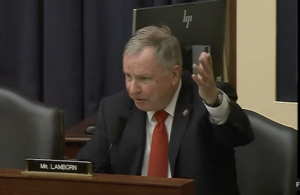Lawmakers continue to question Space Command’s move to Alabama
By Sandra Erwin

WASHINGTON — U.S. Space Command has close ties to other military space organizations in Colorado, but if it has to move to Alabama it could continue to do its job without major disruption, Gen. James Dickinson told lawmakers April 21.
Dickinson’s comments came in response to questions from Rep. Doug Lamborn (R-Colo.) during a hearing of the House Armed Services Committee’s subcommittee on strategic forces.
Lamborn has led the fight to reverse the decision to relocate U.S. Space Command’s headquarters from Peterson Air Force Base in Colorado Springs to Redstone Arsenal in Huntsville, Alabama. He has argued that the decision the Air Force announced in January was politically motivated.
Lamborn challenged Dickinson, who has led U.S. Space Command since August, to explain how a costly relocation made any sense given that much of the military’s space workforce and industrial base currently reside in Colorado — near Peterson Air Force Base, Schriever Air Force Base and Cheyenne Mountain Air Force Station.
Dickinson said the U.S. military “can actually do operations when we’re not geographically located with each of those elements. So there’s synergy by being in the same area but I think there’s equally synergy in being able to do that in a physically distant manner.”
Lamborn insisted that he was not questioning Space Command’s ability to handle the move. “What if the military was told to put Space Command in a cornfield in Iowa? They could do it. We can do whatever we want. But why do it when it’s working so well where it is right now?”
Dickinson again made the point that military combatant commands work together regardless of their physical location. “We’ve had great success over the last 20 months with regard to our relationships with the other combatant commands.”
Rep. Mo Brooks (R-Ala.) later in the hearing pushed back on Lamborn’s assertions that the Air Force did not conduct an objective basing decision.
Brooks ran through the list of criteria used to select the location and said Huntsville satisfied all of them. He noted the area has one of the nation’s highest concentration of engineers. “We have mathematicians scientists, physicists, highly qualified workforce,” said Brooks. “We’ve got a plethora of space related military activities in the Redstone Arsenal. We’re also the home of the Marshall Space Flight Center, which is the birthplace of America’s space program.”
Brooks asked Dickinson if he had any direct knowledge of any political influence on Space Command’s location decision. Dickinson said he did not. He asked the same question to the other witnesses at the hearing — Adm. Charles Richard, commander of U.S. Strategic Command, and Melissa Dalton, acting assistant secretary of defense for strategy, plans and capabilities. Both also said they had no knowledge of any political influence on the basing decision.
The issue of Space Command’s relocation also came up on Tuesday at a Senate Armed Services Committee hearing.
Sen. Jeanne Shaheen (D-NH) told Dickinson she had concerns that the move would result in a loss of civilian workers who cannot be obligated to relocate if they choose not to. Shaheen recalled that when the Missile Defense Agency moved some of its operations from the Washington, D.C. area to Huntsville, it lost 80 percent of its civilian workforce because employees refused to move.
Dickinson said he could not predict how many of Space Command’s civilians would be lost if they didn’t want to move to Alabama. “In the military, we can all agree, we’re somewhat nomadic and we move where the military tells us to,” he said. “But it’s a little bit different when you’re talking about civilians. They’ve made life choices where they’re currently living. And so we will do everything we can to incentivize them to make the move.”
In a statement to SpaceNews after the HASC hearing, Lamborn said Space Command’s relocation would be hugely wasteful.
“Every dollar spent on moving Space Command is a wasted dollar that could be spent on enhancing space capabilities. Eight of the nine Space Force Deltas are in Colorado, and seven of those eight are in Colorado Springs,” he said.
With regard to civilians, Lamborn said he is “deeply concerned about the civilian workforce attrition, which will likely be around 80 percent. Additionally, Huntsville lacks the survivable and redundant infrastructure which are abundant in Colorado Springs. The Department of Defense is about to get a budget cut, and we’re in the midst of a great power competition with Russia and China. Now is not the time to make the expensive, unnecessary, and disruptive decision to move U.S. Space Command and materially damage our national security space enterprise.”
April 22, 2021 at 04:58AM
via SpaceNews read more...

Post a Comment